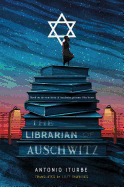
"In Auschwitz, human life has so little value that no one is shot anymore; a bullet is more valuable than a human being. In Auschwitz, there are communal chambers where they administer Zyklon gas. It's cost-effective, killing hundreds of people with just one tank. Death has become an industry which is only profitable if it's done wholesale." It is January 1944, and 14-year-old Dita Adlerova is imprisoned in the hellscape that is Auschwitz-Birkenau. Dita--forced to live in unspeakable conditions, malnourished, cold and constantly fearful--is (horrifyingly) luckier than most. For some reason unknown to the prisoners, camp BIIb is the "family camp," and its inhabitants have a life slightly better than the rest; prisoners in BIIb are allowed to wear their own clothes and, most importantly, have arrived with their families primarily intact, children and elders included.
Fredy Hirsch, a charismatic and enigmatic young man dedicated to the care and teaching of children, has received permission to start a school in BIIb. His makeshift school, Block 31, serves hundreds of young students, with few teachers and the greatest contraband of all: books. In need of someone to manage the use and hiding of the books, Fredy recruits brave Dita to be the librarian of Block 31.
Journalist Antonio Iturbe's The Librarian of Auschwitz is based on the experiences of real-life Auschwitz survivor Dita Kraus. Iturbe interviewed Kraus about her time in Auschwitz, fictionalizing her account in this beautiful and brutal work (expertly translated by Lilit Thwaites). The novel never flinches from the horrors yet shines a light on the everyday lives of people surviving the camp--their relationships, their tiny joys and their immense sorrows. The Librarian of Auschwitz is a heartbreaking and ultimately inspiring work of art. --Siân Gaetano, children's and YA editor, Shelf Awareness

